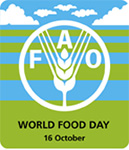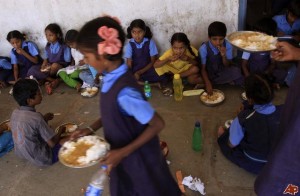 Energy Refuge is taking part of Blog Action Day and the theme this year is food to mark World Food Day. All over the U.S., 300 events will mark the date with Sunday dinners and the involvement of celebrity chefs such as Giada De Lautentiis, Mark Bittman and Jose Andres.
Energy Refuge is taking part of Blog Action Day and the theme this year is food to mark World Food Day. All over the U.S., 300 events will mark the date with Sunday dinners and the involvement of celebrity chefs such as Giada De Lautentiis, Mark Bittman and Jose Andres.
“Around the country, in private homes, farmers markets, schools and churches, Americans will gather to break bread together and have a conversation about the food that sustains all of us and the solutions we can all contribute to make the world a better place,” said Jim French, a Kansas farmer who is organizing events throughout the Midwest for Oxfam. “Our effort this World Food Day aims to bring attention to the injustices of the global food system and get on the path to change.”
World Food Day takes place this year amidst a devastating famine in East Africa that didn’t have to happen and should never happen again. A new documentary special from Oxfam America and Link TV “ViewChange: Africa’s Last Famine,” premieres tonight and will investigate solutions to chronic hunger – including weather insurance and investing in small farmers – disputing the notion that famine is simply caused by a lack of food in the global supply.

The program features the story of one Ethiopian mother and farmer, Medhin Reda, who is using weather insurance to withstand periods of drought. Through interviews with Francis Moore Lappe, the award-winning humanitarian and bestselling author of Diet for a Small Planet, the show takes a look at food justice. According to Moore Lappe in the documentary, “the world produces more than enough for all of us to thrive … the real crisis is the crisis of human relationships, how we share in power.”
“Innovative and effective programs such as Feed the Future, are seeking to build economic opportunity and self-sufficiency for poor farmers around the world, but this and other crucial anti-poverty programs face debilitating cuts in the Congressional budget negotiations taking place today,” said Vicky Rateau, Oxfam America’s GROW campaign manager. “Now is not the time to slash effective programs that deliver more with less. Now is the time to invest in a better, safer, and more prosperous world without hunger.”
One of the actions anyone can take to make a contribution towards food justice is to adopt a plant-based diet. Animal agriculture is one of the biggest sources of greenhouse gas emissions, according to the UN’s Livestock’s Long Shadow report. It found that the livestock industry is responsible for 18% of global greenhouse gas emissions, more than the entire transport sector (which produces 13.5%), including aviation.
A well known study by the University of Chicago found that the average American diet generates the equivalent of nearly 1.5 tonnes more carbon dioxide per person per year than a plant-based (vegan) diet. Besides, plant-based diets only require around one third of the land and water needed to produce a typical Western diet. Farmed animals consume much more protein, water and calories than they produce. A plant-based diet is much kinder to the environment and avoids problems associated with animal farming such as pollution of waterways and land degradation. To get help with a plant-based diet, click here.
Test you world food knowledge by answering the quiz below put together by Save the Children.
You should follow us here.






